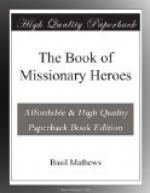At supper his mother looked sadly at her boy with his dancing eyes as he told her about the wonders of the railway engine. In her heart she wanted him to be a minister. And she did not see any sign that this boy would ever become one: this lad of hers who was always running off from his books to peer into the furnaces of the gas works, or to tease the village carpenter into letting him plane a board, or to sit, with chin in hands and elbows on knees, watching the saddler cutting and padding and stitching his leather, or to creep into the carding-mill—like the Budge and Toddy whose lives he had read—“to see weels go wound.”
It was a bitter cold night in the Christmas vacation fourteen years later.[51] Alec Mackay, now a young engineering student, was lost to all sense of time as he read of the hairbreadth escapes and adventures told by the African explorer, Stanley, in his book, How I found Livingstone.
He read these words of Stanley’s:
“For four months and four days I lived with Livingstone in the same house, or in the same boat, or in the same tent, and I never found a fault in him.... Each day’s life with him added to my admiration for him. His gentleness never forsakes him: his hopefulness never deserts him. His is the Spartan heroism, the inflexibility of the Roman, the enduring resolution of the Anglo-Saxon. The man has conquered me.”
Alexander Mackay put down Stanley’s book and gazed into the fire. Since the days when he had trudged as a boy down to the station to see the railway engine he had been a schoolboy in the Grammar School at Aberdeen, and a student in Edinburgh, and while there had worked in the great shipbuilding yards at Leith amid the clang and roar of the rivetters and the engine shop. He was now studying in Berlin, drawing the designs of great engines far more wonderful than the railway engine he had almost worshipped as a boy.
On the desk at Mackay’s side lay his diary in which he wrote his thoughts. In that diary were the words that he himself had written:
“This day last year[52]
Livingstone died—a Scotsman and a
Christian—loving
God and his neighbour, in the heart of Africa.
‘Go thou and do likewise.’”
Mackay wondered. Could it ever be that he would go into the heart of Africa like Livingstone? it seemed impossible. What was the good of an engineer among the lakes and forests of Central Africa?
On the table by the side of Stanley’s How I found Livingstone lay a newspaper, the Edinburgh Daily Review. Mackay glanced at it; then he snatched it up and read eagerly a letter which appeared there. It was a new call to Central Africa—the call, through Stanley, from King M’tesa of Uganda, that home of massacre and torture. These are some of the words that Stanley wrote:




